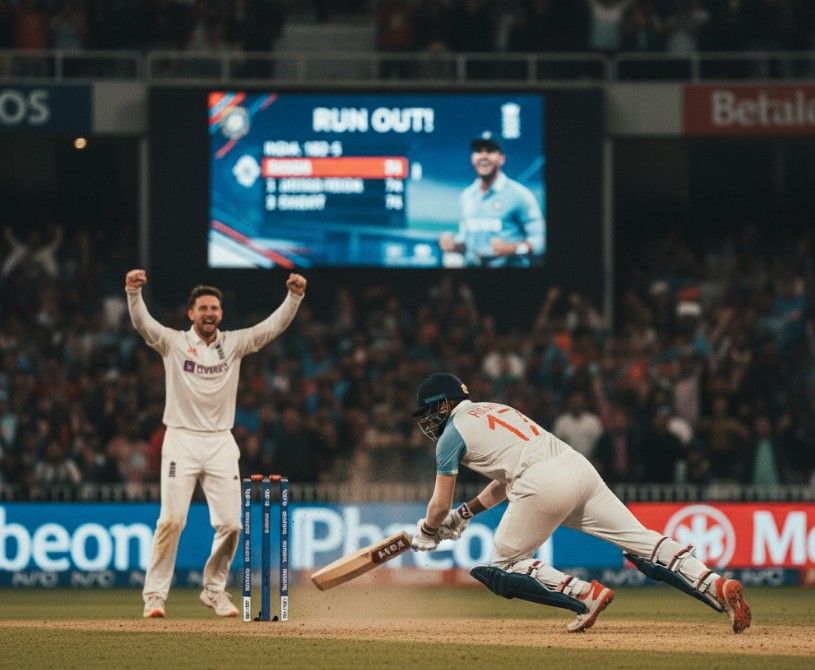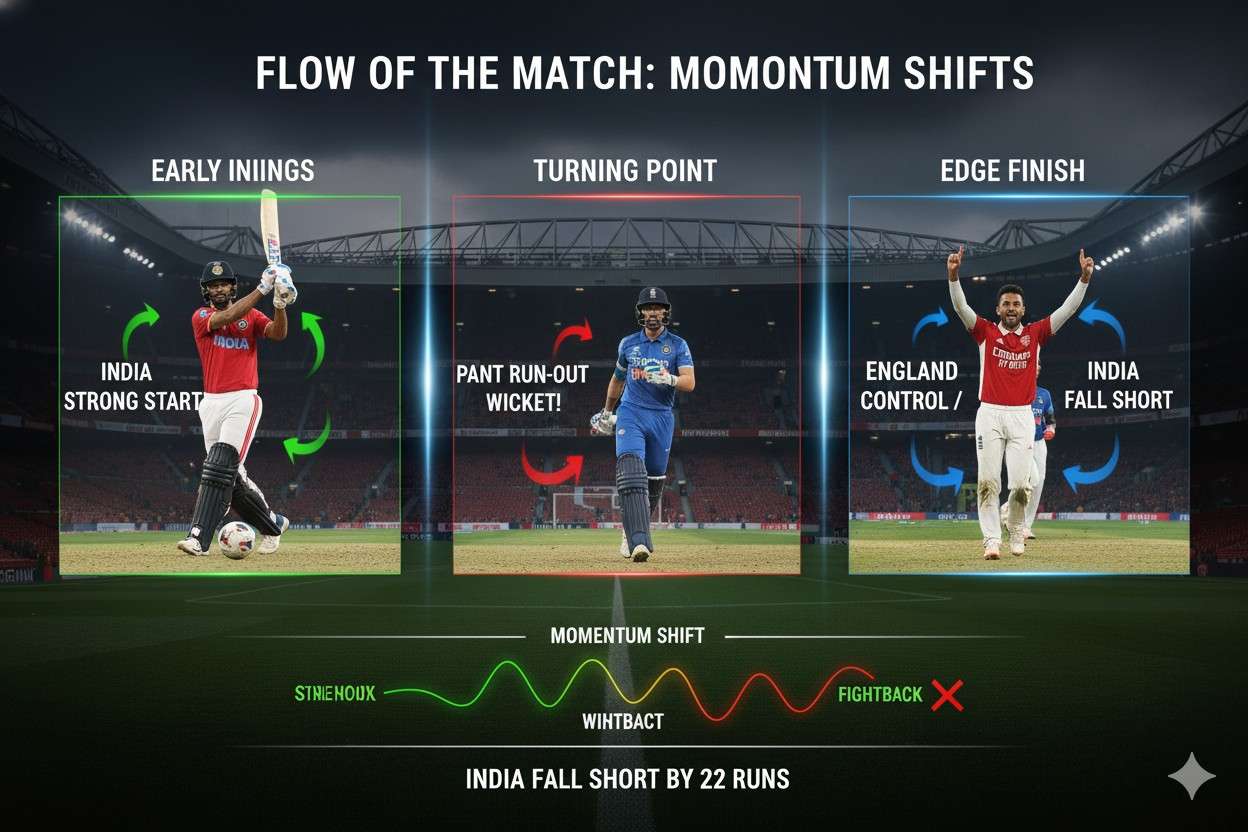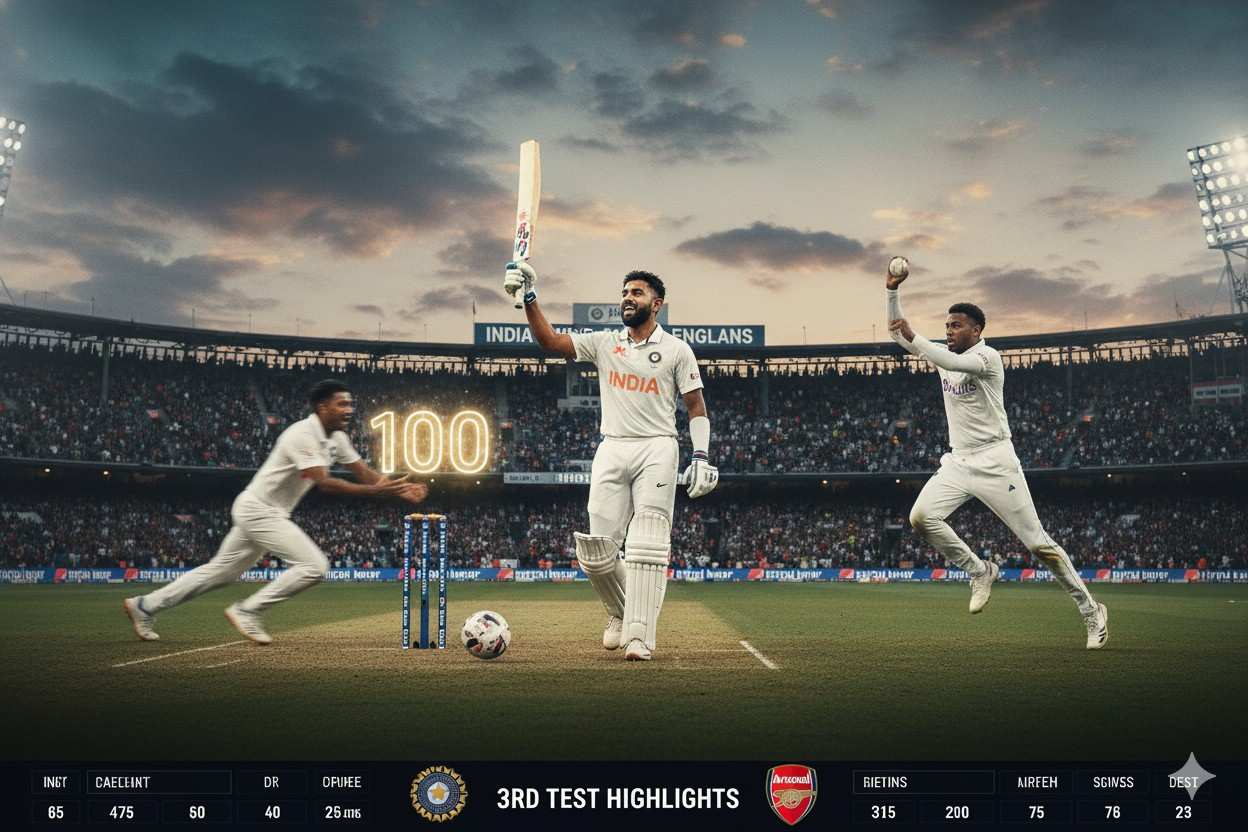The India vs England 3rd Test was one of those matches that reminded fans why Test cricket still captivates the sporting world. It had everything—grit, errors, momentum swings, and brilliance from both sides. Eventually, England emerged victorious by 22 runs, but the storyline went far beyond the scoreboard.
As someone who has followed India-England battles for years, I can say this match was all about small decisions making a huge impact. Let’s break down the three biggest talking points that defined the contest—from Rishabh Pant’s run-out to KL Rahul’s composed century and England’s bowling masterclass led by Jofra Archer.
| Talking Point | Summary | Impact on Match |
| Rishabh Pant run-out | Pant was run out for 74 just before lunch on Day 3 | Shifted momentum; India lost a strong position |
| KL Rahul’s century | Rahul scored 100 off 177 balls to anchor India’s innings | Brought India back level with England in first innings |
| England’s bowling & Archer resurgence | England delivered in the final sessions, with Jofra Archer among key contributors | Choked Indian chase, sealed narrow win for England |
Below, I break these down in depth, putting you in the shoes of a fan, a strategist, and a cricket lover.
1. Rishabh Pant’s Run-out — Biggest Turning Point

One moment that resonated loudly through media rooms and dressing rooms alike was Rishabh Pant’s run-out. With India threatening to build on their position, Pant, on 74, was run out just before lunch on Day 3 by a sharp direct throw from Ben Stokes, off Shoaib Bashir’s bowling.
Indian captain Shubman Gill was vocal afterward, calling it an “error of judgment” and labeling it the biggest moment in that Test. Up until that point, India had the momentum to push for a lead; Pant’s wicket broke the flow.
In tactical terms, the dismissal forced India to reorganize, rebuild partnerships, and rethink how aggressively they could press. For England, it was the injection point — a bolstered belief that they could wrestle back control.
2. KL Rahul’s Century & India’s First-Innings Response
Had India not recovered from that shock run-out, the match might have slipped away early. But KL Rahul stepped up with a composed and determined century (100 off 177 balls). His innings came under pressure, but Rahul’s temperament, shot selection, and application were exemplary. He absorbed phases of tight bowling and grew into the innings. Support came from Rishabh Pant (74) and Ravindra Jadeja (72) — a middle-order revival that helped India equal England’s 387. The significance? India avoided a deficit, stayed level, and kept the Test alive. That shift in psychological energy mattered as much as the numbers.
3. England’s Bowling Attack & Archer’s Return to Form

While India’s batting got them through the first innings, England’s bowlers applied in the final stretches, making the difference. The second innings saw them put pressure, change ends, and strike at vital moments.
Jofra Archer, returning to Test action, delivered with pace, aggression, and well-timed breakthroughs. England captain Ben Stokes had signaled confidence before the match, expecting Archer to do “something special.” His bursts in the later sessions unsettled India’s chase.
But England’s success wasn’t just about one bowler — Chris Woakes, Shoaib Bashir, and the supporting bowlers chipped in with control and discipline. They managed to maintain pressure, exploit gaps, and avoid collapse under Indian counterattacks. In the final morning, their tactical shifts and perseverance got rewarded — and India couldn’t break through.
Flow of the Match: Momentum Shifts
- Early innings: India in a strong position after Pant and Rahul’s stand.
- Turning point: Pant run-out breaks rhythm.
- Recovery: Rahul’s century steadies the innings.
- Bowling on top: England push in final innings, control wicket phases.
- Edge finish: India fall short by 22 runs, despite fightback.
That ebb and flow — pressure, recovery, counter-pressure — made this Test memorable.

Also Read: Ban vs WI 2nd T20 Dream11 Predictions Preview
FAQs: India vs England 3rd Test Talking Points
Q1. Why is Pant’s run-out considered so decisive?
Because India was on a path to build a lead. Losing Pant at that moment disrupted momentum and allowed England to claw back psychologically. Gill himself called it the game’s “biggest moment.”
Q2. Did Rahul’s century save India?
It didn’t save them outright, but it prevented a deficit and kept the Test in balance. Without that knock, the outcome would have likely been more one-sided.
Q3. How important was Archer’s return?
Extremely. His spell in the latter part of the match added bite and pressure, helping England seal control when it mattered. His comeback was integral to their bowling success.
Q4. Could India have bowled differently or made tactical changes?
It’s always easy to second-guess in hindsight. Some feel using attacking fields, changing bowling rotations, or attacking with the new ball in the final session might have squeezed England more. But England’s discipline made every adjustment tough.
Final Thoughts
The India vs England 3rd Test came down to fine margins. Pant’s run-out shifted momentum, Rahul’s century restored balance, and England’s bowlers—led by Archer—finished the job with precision.
India fought hard but lacked the composure to close it out, while England’s discipline and belief made the difference. A 22-run gap summed up a match where every decision, every delivery, truly mattered.




